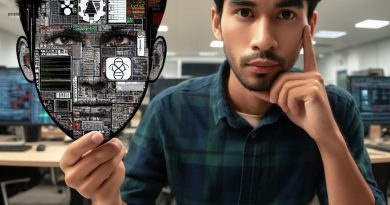Cracking the Code: Best Practices for Efficient Learning
Last Updated on January 27, 2024
Introduction
Efficient learning is the key to maximizing our potential and achieving success in any endeavor.
It involves finding the right strategies and techniques to optimize our learning process.
In today’s fast-paced world, where information is abundant and constantly evolving, it is crucial to develop efficient learning skills.
By doing so, we can effectively process and retain information, enabling us to stay ahead and adapt to new challenges.
Finding the right strategies and techniques is essential. Each person has unique learning preferences and styles, and what works for one may not work for another.
Therefore, it is important to explore and experiment with different approaches to discover what works best for us.
Efficient learning goes beyond just memorizing facts and figures.
It involves understanding concepts deeply and making meaningful connections between different pieces of information.
By doing so, we can not only retain information for the short term but also build a strong foundation for long-term learning and problem-solving.
Furthermore, efficient learning helps us stay focused and manage our time effectively.
With the overwhelming amount of information available, it is easy to get distracted or overwhelmed.
However, by applying effective learning techniques, we can prioritize and allocate our time wisely.
In short, efficient learning is vital in today’s rapidly changing world.
By finding the right strategies and techniques, we can optimize our learning process, retain information effectively, and adapt to new challenges.
Let us embark on this journey of cracking the code for efficient learning!
Understanding the Learning Process
Understanding how we learn is crucial for efficient and effective learning.
By recognizing and embracing our individual learning style, we can optimize our learning process and achieve better results.
Different learning styles
Everyone learns differently, and it’s important to understand the types of learners that exist.
Visual learners thrive when they can see information through diagrams, charts, or graphs.
They benefit from visual aids, such as videos or slide presentations, which help them process and retain information
On the other hand, auditory learners absorb knowledge best through listening and verbalizing.
They may prefer lectures, discussions, or podcasts, as hearing information helps them understand and remember it more effectively.
Kinesthetic learners, also known as tactile learners, learn by doing and experiencing things firsthand.
They prefer hands-on activities, simulations, or experiments that involve physical movement.
Touching, building, or manipulating objects helps them grasp concepts and retain information.
Identifying one’s preferred learning style
Recognizing our preferred learning style allows us to tailor our study methods accordingly.
To assess personal preferences, we can reflect on our past learning experiences.
Were there specific activities or techniques that stood out as being particularly effective for us? Identifying patterns in our learning can reveal our preferred style.
To further refine our understanding, it is essential to experiment with different learning methods.
Trying out new strategies allows us to explore other learning styles and discover new techniques that may increase our retention and comprehension.
By widening our range of approaches, we increase the likelihood of finding the most suitable methods for our learning style.
The role of motivation in learning
Motivation plays a vital role in learning. Without it, the learning process can become tedious and unproductive.
- Setting clear goals: Clearly defined objectives give us a sense of direction and purpose, helping us stay focused and committed to our learning journey.
- Finding intrinsic motivation is also crucial: When we can connect new knowledge to our personal interests, passions, or values, learning becomes more meaningful and enjoyable.
- Overcoming obstacles and maintaining focus: Overcoming these obstacles requires resilience and perseverance. Developing a growth mindset, viewing challenges as opportunities for growth, and seeking support when needed can help us maintain focus and keep moving forward.
In essence, understanding the learning process is instrumental in optimizing our educational endeavors.
By identifying our preferred learning style, experimenting with different methods, and nurturing our motivation, we can embark on a more efficient and fruitful learning journey.
Embracing our uniqueness as learners empowers us to unlock our full potential and acquire knowledge more effectively.
Read: Creating the Next Social Media: Start with Code Skills
Strategies for Efficient Learning
In order to excel in learning, it is crucial to employ effective strategies that optimize the process.
This section focuses on various strategies that can help individuals become efficient learners.
Effective study techniques
One of the fundamental practices for efficient learning is taking organized notes.
When individuals take concise, well-structured notes, they impose a sense of order on the information they are trying to learn.
This process allows for easier comprehension and better retention of the material.
Active reading and comprehension strategies also play a vital role in efficient learning.
By engaging actively with the material, such as underlining key points or asking questions, individuals are more likely to understand and remember the content.
These strategies enhance comprehension and make the learning process more effective.
Utilizing mnemonic devices is another effective technique to improve learning efficiency.
Mnemonic techniques, like creating acronyms or using visual imagery, help individuals remember and recall complex information.
By linking information to a familiar concept or image, mnemonic devices facilitate easier retrieval of knowledge.
Chunking information is yet another strategy that enhances learning efficiency.
Breaking down large amounts of information into smaller, manageable chunks allows for better processing and memorization.
By organizing related information together, individuals can understand and remember the content more effectively.
Time management
Effective time management is crucial for efficient learning.
Developing a study schedule helps individuals set aside dedicated time for learning.
By allocating specific time slots for studying, individuals can establish a routine and ensure consistent progress in their learning journey.
Utilizing time blocking techniques is another effective time management strategy.
By assigning specific time blocks for different tasks, individuals can focus solely on one task at a time.
This technique improves concentration and productivity, as it eliminates the distraction and inefficiency that come with multitasking.
Avoiding multitasking is essential for efficient learning.
By focusing on one task at a time, individuals can dedicate their full attention and effort to that particular task.
This allows for better concentration, improved learning, and ultimately, better retention of the information.
Utilizing technology and online resources
The advancement of technology provides numerous opportunities for efficient learning.
When using online resources, it is crucial to find reliable sources.
Credible and trustworthy sources ensure that individuals access accurate information, enabling effective learning.
Educational apps and platforms are valuable tools for efficient learning.
These resources offer interactive and engaging content that caters to different learning styles.
By incorporating multimedia elements and gamified features, educational apps facilitate better understanding and retention of the material.
Participating in online learning communities is another way to enhance learning efficiency.
Joining forums or discussion boards allows individuals to connect with peers who have similar learning goals.
These communities foster collaboration, encourage discussion, and provide opportunities to share knowledge, resulting in a more enriching learning experience.
In fact, adopting effective strategies is key to achieving efficient learning.
By utilizing techniques such as taking organized notes, using mnemonic devices, and chunking information, individuals can enhance comprehension and retention.
Additionally, practicing time management and utilizing technology and online resources further contribute to efficient learning.
By incorporating these strategies into their learning practices, individuals can unlock their full learning potential and achieve academic success.
Read: Top 5 High-Paying Tech Jobs for New Coders in USA

Overcoming Learning Challenges
When it comes to efficient learning, there are common challenges that many individuals face.
However, by implementing effective strategies and techniques, these obstacles can be overcome.
This section will explore some of the most common learning challenges and provide practical tips for conquering them.
Dealing with procrastination
Procrastination is a common obstacle that prevents efficient learning.
By identifying the root causes of procrastination, individuals can effectively address and overcome it.
It is crucial to break tasks into smaller, manageable steps, as this makes them less overwhelming and easier to start.
Therefore, implementing strategies for self-discipline, such as setting deadlines and rewards, can combat procrastination effectively.
Handling information overload
In today’s digital age, information overload is a significant challenge.
To tackle this challenge, individuals should prioritize relevant information, organizing and processing it effectively.
Breaking down complex topics into smaller, digestible chunks enhances understanding and retention.
Also, utilizing visual aids and diagrams can simplify complex information, making it easier to comprehend and remember.
Dealing with distractions
Distractions can significantly hinder efficient learning.
Creating a conducive study environment with minimal distractions is essential for promoting focus and concentration.
This can be achieved by finding a quiet and comfortable space to study.
Moreover, minimizing digital distractions, such as turning off notifications and blocking distracting websites, improves productivity and allows for better focus.
Utilizing focus and meditation techniques, like deep breathing and mindfulness, can help regain focus and handle distractions effectively.
When it comes to efficient learning, there are common challenges that many individuals face.
However, by implementing effective strategies and techniques, these obstacles can be overcome.
Read: Preparing for Coding Dojo: Essential Pre-bootcamp Study
Delve into the Subject: The Future of Coding: What Lies Ahead for America
Enhancing Long-Term Retention
Enhancing long-term retention is crucial for efficient learning.
Simply acquiring new information is not enough; it is equally important to ensure that the information is retained and can be recalled when needed.
Here are some effective techniques to enhance long-term retention:
Effective review and repetition techniques
- Spaced repetition: This technique involves reviewing material at increasing intervals over time. Instead of cramming all the information at once, spaced repetition allows for better distribution of study sessions.
- Retrieval practice: Retrieval practice involves actively recalling information without referring to notes or resources. This technique challenges the brain to retrieve information from memory, strengthening the memory trace.
- Interleaving different topics: This technique involves switching between different subjects or topics within a single session. The rationale behind this technique is that it forces the brain to make connections between different areas of knowledge, leading to more robust learning and retention.
Mindful learning and reflection
- Engaging in self-reflection: Engaging in self-reflection allows individuals to understand their personal learning strengths and weaknesses. By reflecting on the learning process, one can identify effective strategies, areas that need improvement, and personal preferences for learning.
- Connecting new knowledge to existing knowledge: To enhance long-term retention, it is essential to connect new knowledge to existing knowledge. Making associations between new information and what you already know helps build a strong network of interconnected knowledge, making it easier to retrieve information later.
- Actively engaging in the learning process: Passive learning approaches, such as simply reading or listening, are not as effective for long-term retention. Actively engaging in the learning process by being fully attentive, asking questions, seeking clarification, and participating actively in discussions or activities enhances understanding and memory.
As a matter of fact, enhancing long-term retention is essential for efficient learning.
By utilizing effective review and repetition techniques like spaced repetition and retrieval practice, and incorporating mindful learning and reflection strategies.
Actively engaging in the learning process further promotes better understanding and retention.
Remember, efficient learning involves not only acquiring new information but also ensuring its long-term retention and usability.
Read: Transitioning from Block Coding to Text-based Programming
Conclusion
This blog post has focused on exploring the best practices for efficient learning.
Throughout the section, we have highlighted several key points that can greatly impact one’s learning process.
Firstly, we discussed the effectiveness of active learning methods, such as self-quizzing and teaching others, in enhancing comprehension and retention.
These techniques encourage active participation and engagement, leading to better knowledge acquisition.
These strategies help to reinforce learning over time and create connections between different topics, improving long-term memory.
By utilizing techniques like the Pomodoro Technique or time-blocking, learners can maintain focus and avoid burnout while maximizing productivity.
It is crucial to acknowledge that everyone learns differently.
Therefore, we encourage readers to experiment with different techniques and find what works best for them.
By being open to trying new approaches, individuals can discover their unique learning preferences and optimize their study habits accordingly.
Lastly, we cannot underestimate the significance of consistent practice and dedication to efficient learning.
Developing a routine and committing to regular study sessions enables learners to build a strong foundation of knowledge and skills.
By implementing the discussed strategies and approaches, learners can unlock their true potential and achieve success in their educational pursuits.
So, let’s get started and embark on a path to efficient learning!


